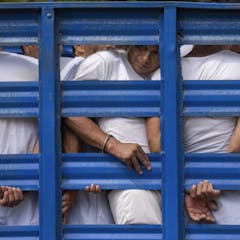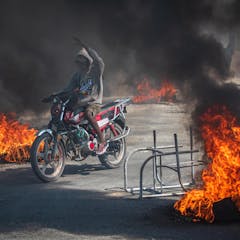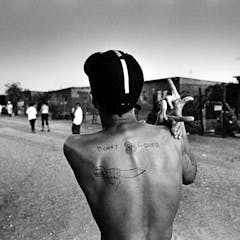
Articles on Gangs
Displaying 1 - 20 of 88 articles

The armed gangs of Haiti have a very clear assessment of their power as movers and shakers of the country’s future.

Haiti will be able to emerge from the crisis it is in if it has a strong public administration and co-ordinated international aid from countries that respect human rights.

Ecuador is soon holding a referendum to decide whether to follow El Salvador’s controversial strategy to end drug trafficking.

Haiti is descending into anarchy, causing the gang leader behind the violence to emerge as the country’s most powerful leader.

Haiti is facing a wave of chaos as gang violence grips the country.

Mass arrests and the suspension of constitutional rights have been a feature of President Nayib Bukele’s tenure. A fresh mandate from voters will likely entrench his hardline approach.

The government’s promised crack-down on gangs may have to work around existing legislation – and human rights provisions.

Ecuador’s murder rate has shot up in recent years and now a presidential candidate has been assassinated.

More than being the social problem they are often made out to be, gangs are an indication of larger problems present in their societies.

The UN is calling for a specialized support force in Haiti, where urban gangs are terrorizing the population and people are starving. Why won’t Canada step up to help?

Hand gestures are notoriously prone to misinterpretation.

Through their mastery of the environment and target selection, the Badoo cult gang was able to unleash terror among residents.

Universities and students need to be aware of the prevalence of organised drug dealing on campuses.

Historically, most mass shootings in South Africa have been associated with three main things: gang conflicts, rivalries in the minibus taxi sector and factional or inter-group feuds.

In 2013 stories emerged of gangs stealing plasma TV screens to use to make street drugs. It’s a myth, but it tells us something about South Africa’s social anxieties.

History shows there is no magic bullet for solving gang crime. Only an evidence-based approach, coupled with mutually agreed targets and indicators, will start to achieve real change.

Since rap music emerged in mainstream culture in the late 1980s, conservatives have derided its lyrics and imagery as violent. But hip-hop artists argue those images reflect urban realities.

A look at what was happening in the lives of young people one year before they started carrying a weapon.

The study revealed a link between youth, troubled behaviour and a lack of access to recreational spaces in marginalised communities.

Gangs are using coercive control tactics to recruit young women into criminal activity.
